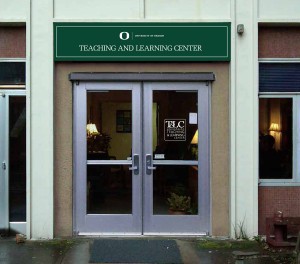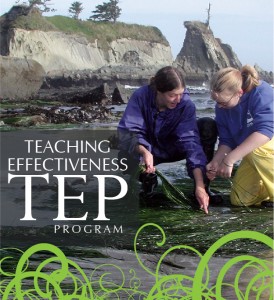
TEP and the rest of the Teaching and Learning Center services are located in Prince Lucien Campbell Hall, lower level.
The Teaching Effectiveness Program (TEP) aims to be a driver of innovation and excellence, giving faculty tools and confidence to try worthwhile teaching experiments, and also a resource for measuring the effects of those experiments on student learning and motivation.
Faculty and GTF Support
The particular focus of TEP is on helping UO faculty and GTFs provide an integrative, holistic, high-quality residential learning experience for undergraduates. TEP’s work with technology promotes ways for undergraduate classes to be more connected, creative, and interactive. TEP focuses on teaching and learning goals considering technological alongside more traditional solutions, presenting a range of strategies:
- Instructional technology support through individual consultations
- Workshops, seminars, and conversations on teaching
- Assist instructors in exploring various technologies for creating learning experiences, including:
- best practice considerations for using some campus-wide available technologies (such as Blackboard/Canvas, UO Blogs, and iClickers)
- offer suggestions for how instructors might initiate and guide particular technology-supported learning activities
- examine options and benefits for using technology in a classroom
- promote thinking and reflection about the best uses of technology in the classroom.
New Programs For Excellence in Teaching and Learning
 A Faculty Fellows Program has begun to bring on board to TEP senior members of the faculty with distinguished teaching records for one- or two-year terms. The Fellows will host teaching-development programming and conduct teaching-focused research around their areas of interest. TEP has received a Williams Fund award to support their first Teaching Excellence Senior Fellow in the 2016 calendar year.
A Faculty Fellows Program has begun to bring on board to TEP senior members of the faculty with distinguished teaching records for one- or two-year terms. The Fellows will host teaching-development programming and conduct teaching-focused research around their areas of interest. TEP has received a Williams Fund award to support their first Teaching Excellence Senior Fellow in the 2016 calendar year.
TEP is enhancing its ability to pursue teaching and learning research to help shape policy, inform campus-wide and even national conversations, and ensure faculty have the information they want in order to achieve the student learning outcomes they care about deeply. TEP has created Graduate Student Teacher-Scholars positions that will bring graduate students into their ranks for pedagogical training, to do consultations with other graduate teaching fellows and, most intriguingly, to work with TEP to design and implement pedagogical-based research projects. The first Graduate Student Teacher-Scholar joined the staff in January 2015 and two more GTF peer mentors have been funded for AY 2015-16.
TEP is forming Intentional Working Groups to support longer-term commitments to faculty communities of interest like the current TEP-CMET-Yamada Language Center co-led Working Group on Active Teaching and Learning. The current group, funded through pledges from Academic Affairs, the College of Arts and Sciences, and Undergraduate Studies, provides $1K stipends for each of 16 participants. In two years of application cycles, they have drawn 67 outstanding applicants from every rank and more than two-dozen different departments. In addition, TEP is working with Academic Extension and CMET to create a faculty-training program to support high-quality teaching online for a cohort of faculty from the Lundquist College of Business. The training will launch in Fall 2015 will be co-taught online and in facilitated face-to-face workshops, modeling best practice, especially around creating engaged, “personable” courses and sophisticated course activities that sophisticated course activities that insist on students’ higher-order thinking.
